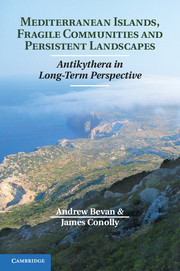 Mediterranean Islands, Fragile Communities and Persistent Landscapes
Mediterranean Islands, Fragile Communities and Persistent Landscapes Book contents
- Frontmatter
- Dedication
- Contents
- Figures and Colour Plates
- Tables
- Acknowledgements
- Abbreviations
- 1 Problems and Perspectives
- 2 Methods and Data
- 3 A Mediterranean and Island Environment
- 4 Material Worlds
- 5 Landscape Archaeology and Historical Ecology I
- 6 Landscape Archaeology and Historical Ecology II
- 7 Mobility and Investment
- 8 The Eccentric, the Specialist and the Displaced
- 9 Antikythera in Context
- Appendix I Statistical and Computational Methods
- Appendix II Locations by Period
- Miscellaneous Endmatter
- Notes
- Bibliography
- Index
1 - Problems and Perspectives
Published online by Cambridge University Press: 05 July 2013
- Frontmatter
- Dedication
- Contents
- Figures and Colour Plates
- Tables
- Acknowledgements
- Abbreviations
- 1 Problems and Perspectives
- 2 Methods and Data
- 3 A Mediterranean and Island Environment
- 4 Material Worlds
- 5 Landscape Archaeology and Historical Ecology I
- 6 Landscape Archaeology and Historical Ecology II
- 7 Mobility and Investment
- 8 The Eccentric, the Specialist and the Displaced
- 9 Antikythera in Context
- Appendix I Statistical and Computational Methods
- Appendix II Locations by Period
- Miscellaneous Endmatter
- Notes
- Bibliography
- Index
Summary
INTRODUCTION
The study of Mediterranean landscapes and of longue durée histories, island cultures and complex human ecologies have all developed into major research agendas over the past half-century, engaging large swathes of the social and natural sciences. This book brings together these established investigative traditions by considering Antikythera, a tiny island perched on the edge of the Aegean and Ionian seas, over the full course of its approximately seven-thousand-year history of documented human activity. As a research setting, this island offers rare advantages. First, small islands (a category we define later in the chapter) are particularly interesting because their plant, animal and human populations can be susceptible to abrupt demographic changes, and, most clearly in the case of humans, often show cycles of colonisation, near or complete abandonment, and recolonisation. Such a comparatively discontinuous record makes it easier to distinguish between different settlement and land use strategies than in many other contexts where the occupation of landscapes may be more continuous. Small islands have thus been invoked as interesting descriptive vignettes from time to time but, surprisingly, have rarely been the focus of systematic Mediterranean landscape-scale research. Antikythera (20.8 km2)is now one of the best-documented examples of these, with a punctuated human presence from the Neolithic through to the present day, and this provides substantial insight into the dynamics of human settlement and ecology over the long term.
Information
- Type
- Chapter
- Information
- Mediterranean Islands, Fragile Communities and Persistent LandscapesAntikythera in Long-Term Perspective, pp. 1 - 11Publisher: Cambridge University PressPrint publication year: 2013